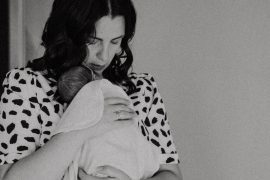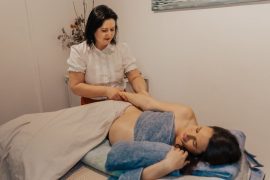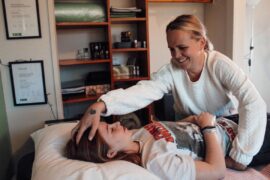What exactly IS a prolapse?
A prolapse is when your organs have dropped below their optimal position. There are three kinds of prolapses, distinguished by which organ has moved. The three organs that can prolapse in your pelvic floor are your bladder, your cervix and uterus (they are connected), or your rectum.
How did this happen?
Some women experience prolapse immediately after giving birth. Extended periods of pushing, fast expulsions, or pushing with a full bladder can sometimes contribute to a prolapse. In this case, most women don’t actually feel the prolapse happen.
You may know exactly how and when your organs dropped down. There may have been a moment when you sneezed and felt things slide down. Or maybe you may have twisted awkwardly to put the car seat in the car and felt a sudden shift.
The most common cause of prolapse that I see in my office is due to overexertion post-partum. Many new mums who feel great after they have given birth get back to their regular activity level and then notice that they have a stage 1,2 or 3 prolapse. New mums are also eager to get back into shape and begin running before there is enough lower back, abdominal and pelvic floor tone to support the bouncing of running. Often, a prolapse ensues.
Frustration Factor
There are many things that can affect your speed of recovery from prolapse. Breastfeeding can affect prolapse because of the hormone relaxin which increases the laxity and softness of ligaments. Ligaments are part of what hold organs in place. So expect to feel a jump in life force and tone when you stop breastfeeding.
Prolapse can also be particularly frustrating because it is unpredictable and does not always correlate with activity level. One day you might be resting and feel that the prolapse is worse. The next day you might go for a walk and surprisingly feel like everything is suspended and light. And then the following day you could feel them lower and heavier again. It can be slow going, but in most cases, non-surgical is both possible, and optimal!
I have been there – I had a rectal prolapse with fecal incontinence and I have healed myself. I do an almost daily practice so that I can experience the joy and freedom of light organs and an ability to use my body however I want to.
Originally published HERE.
Kimberly Ann Johnson is a sexological bodyworker, somatic experiencing trauma resolution practitioner, birth doula, postpartum care revolutionary and single mom. She specializes in helping women hands-on, hands-in prepare for birth, recover from birth injuries and birth trauma, and heal from sexual trauma. She is the author of The Fourth Trimester: A Postpartum Guide to Healing Your Body, Balancing Your Emotions and Restoring Your Vitality. You can read more about her work and become a part of the Magamama movement at www.Magamama.com.










